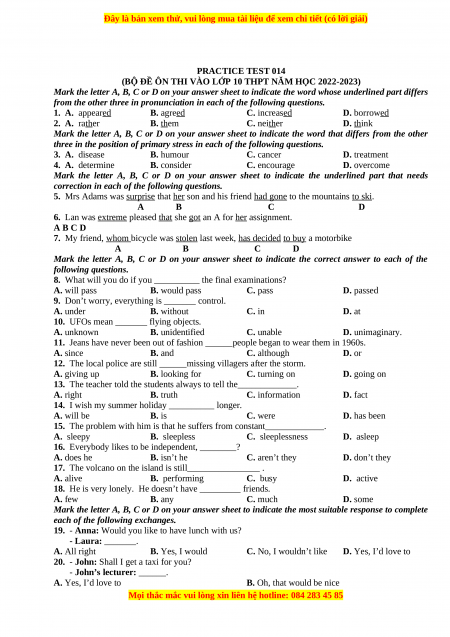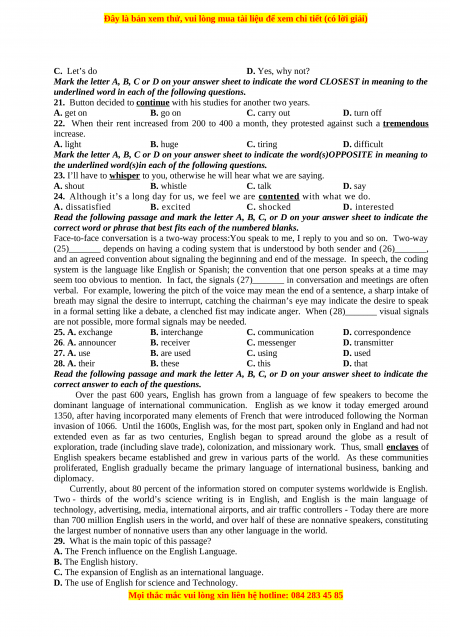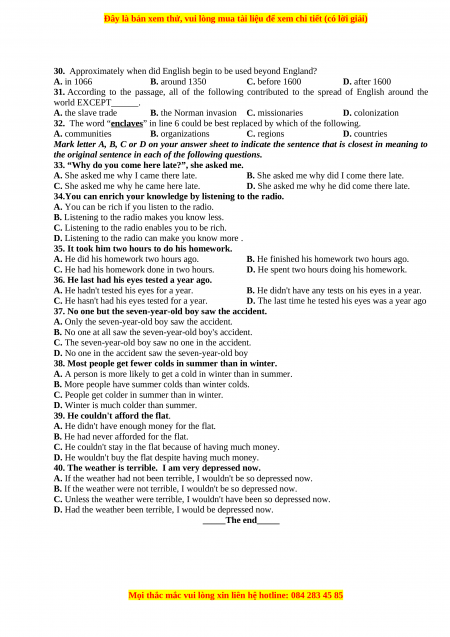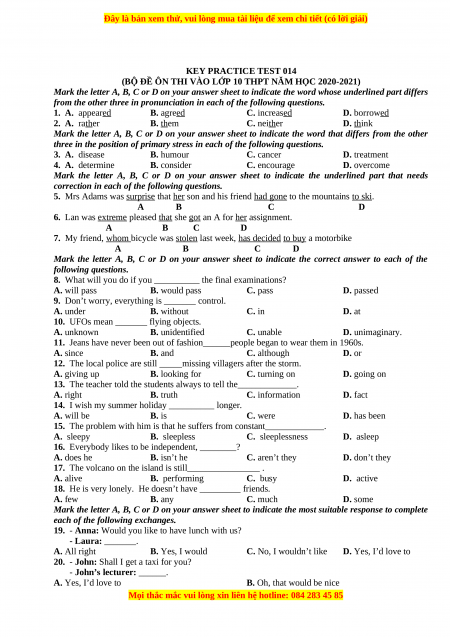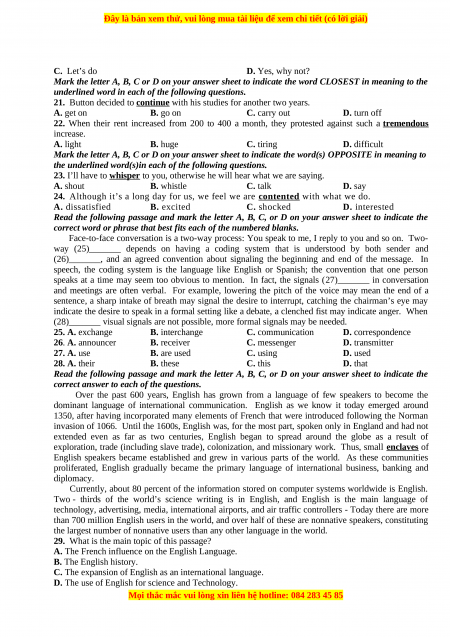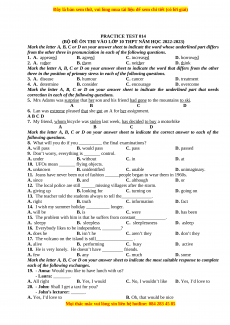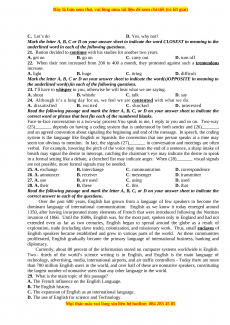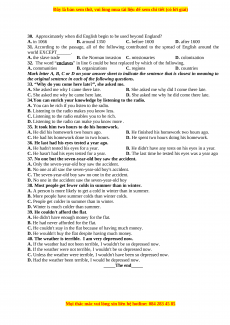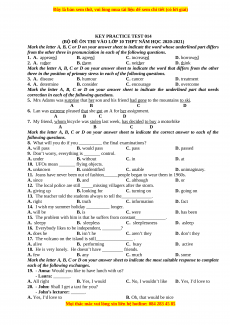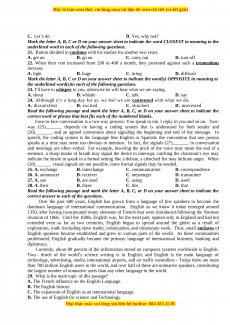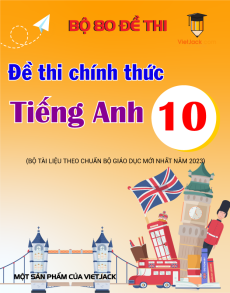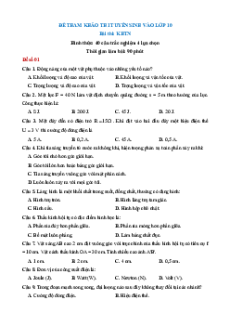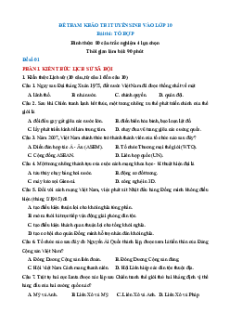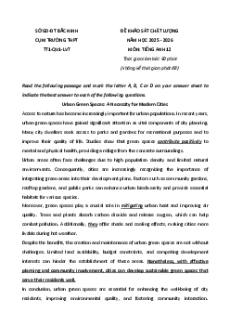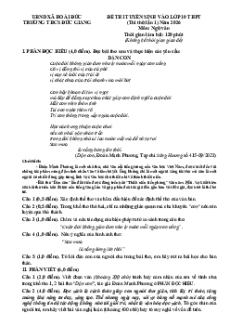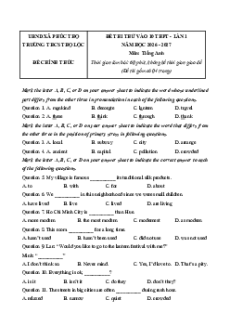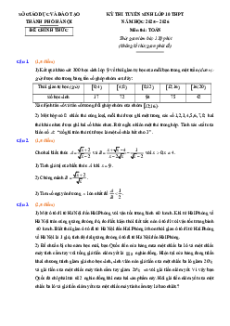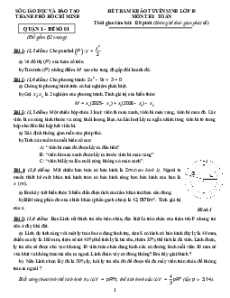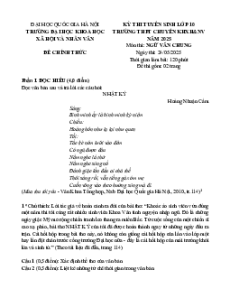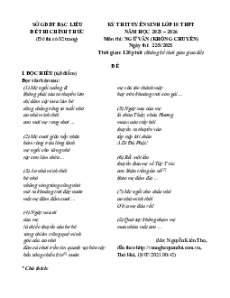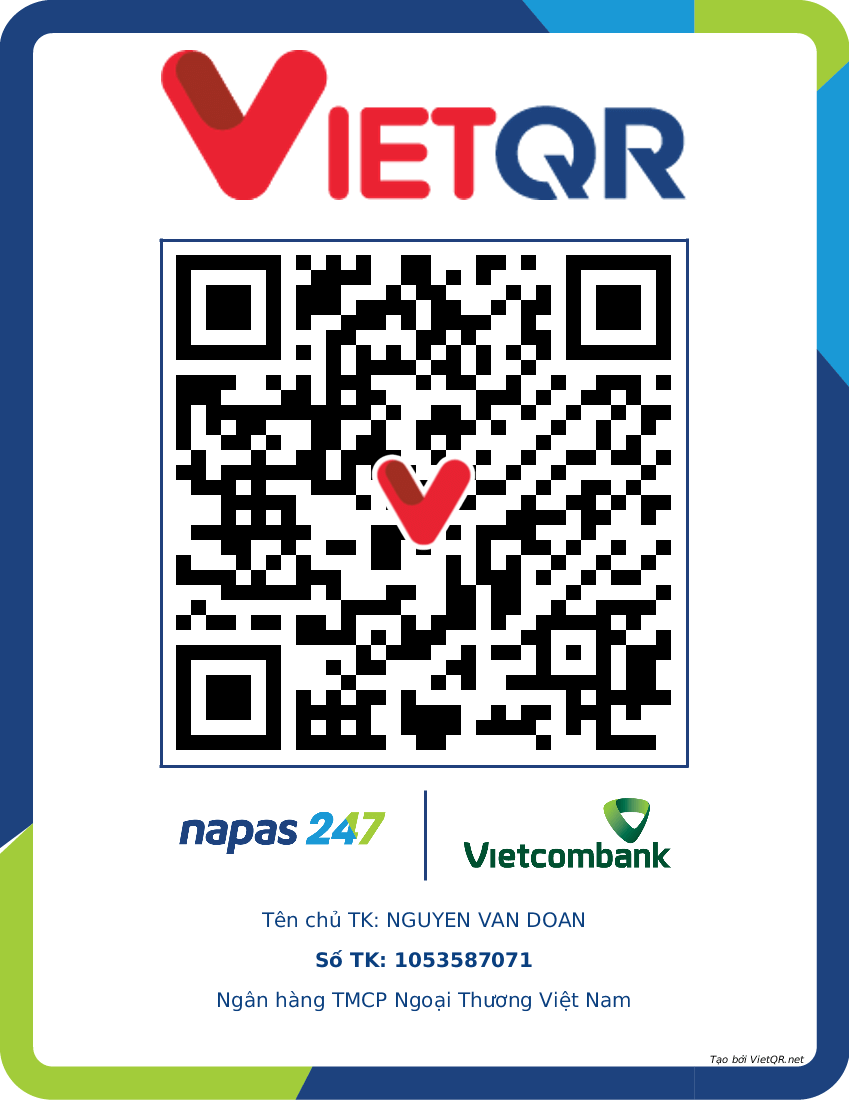PRACTICE TEST 014
(BỘ ĐỀ ÔN THI VÀO LỚP 10 THPT NĂM HỌC 2022-2023)
Mark the letter A, B, C or D on your answer sheet to indicate the word whose underlined part differs
from the other three in pronunciation in each of the following questions.
1. A. appeared B. agreed C. increased D. borrowed 2. A. rather B. them C. neither D. think
Mark the letter A, B, C or D on your answer sheet to indicate the word that differs from the other
three in the position of primary stress in each of the following questions.
3. A. disease B. humour C. cancer D. treatment 4. A. determine B. consider C. encourage D. overcome
Mark the letter A, B, C or D on your answer sheet to indicate the underlined part that needs
correction in each of the following questions.
5. Mrs Adams was surprise that her son and his friend had gone to the mountains to ski. A B C D
6. Lan was extreme pleased that she got an A for her assignment. A B C D 7. My friend, w
hom bicycle was stolen last week, has decided to buy a motorbike A B C D
Mark the letter A, B, C or D on your answer sheet to indicate the correct answer to each of the following questions.
8. What will you do if you __________ the final examinations? A. will pass B. would pass C. pass D. passed
9. Don’t worry, everything is _______ control. A. under B. without C. in D. at
10. UFOs mean _______ flying objects. A. unknown B. unidentified C. unable D. unimaginary.
11. Jeans have never been out of fashion ______people began to wear them in 1960s. A. since B. and C. although D. or
12. The local police are still ______missing villagers after the storm. A. giving up B. looking for C. turning on D. going on
13. The teacher told the students always to tell the_____________. A. right B. truth C. information D. fact
14. I wish my summer holiday __________ longer. A. will be B. is C. were D. has been
15. The problem with him is that he suffers from constant_____________. A. sleepy B. sleepless C. sleeplessness D. asleep
16. Everybody likes to be independent, ________? A. does he B. isn’t he C. aren’t they D. don’t they
17. The volcano on the island is still________________ . A. alive B. performing C. busy D. active
18. He is very lonely. He doesn’t have _________ friends. A. few B. any C. much D. some
Mark the letter A, B, C or D on your answer sheet to indicate the most suitable response to complete
each of the following exchanges.
19. - Anna: Would you like to have lunch with us? - Laura: _______. A. All right B. Yes, I would
C. No, I wouldn’t like D. Yes, I’d love to
20. - John: Shall I get a taxi for you?
- John’s lecturer: ______. A. Yes, I’d love to
B. Oh, that would be nice
C. Let’s do D. Yes, why not?
Mark the letter A, B, C or D on your answer sheet to indicate the word CLOSEST in meaning to the
underlined word in each of the following questions.
21. Button decided to continue with his studies for another two years. A. get on B. go on C. carry out D. turn off
22. When their rent increased from 200 to 400 a month, they protested against such a tremendous increase. A. light B. huge C. tiring D. difficult
Mark the letter A, B, C or D on your answer sheet to indicate the word(s)OPPOSITE in meaning to
the underlined word(s)in each of the following questions.
23. I’ll have to whisper to you, otherwise he will hear what we are saying. A. shout B. whistle C. talk D. say
24. Although it’s a long day for us, we feel we are contented with what we do. A. dissatisfied B. excited C. shocked D. interested
Read the following passage and mark the letter A, B, C, or D on your answer sheet to indicate the
correct word or phrase that best fits each of the numbered blanks.
Face-to-face conversation is a two-way process:You speak to me, I reply to you and so on. Two-way
(25)_______ depends on having a coding system that is understood by both sender and (26)_______,
and an agreed convention about signaling the beginning and end of the message. In speech, the coding
system is the language like English or Spanish; the convention that one person speaks at a time may
seem too obvious to mention. In fact, the signals (27)_______ in conversation and meetings are often
verbal. For example, lowering the pitch of the voice may mean the end of a sentence, a sharp intake of
breath may signal the desire to interrupt, catching the chairman’s eye may indicate the desire to speak
in a formal setting like a debate, a clenched fist may indicate anger. When (28)_______ visual signals
are not possible, more formal signals may be needed. 25. A. exchange B. interchange C. communication D. correspondence
26. A. announcer B. receiver C. messenger D. transmitter 27. A. use B. are used C. using D. used 28. A. their B. these C. this D. that
Read the following passage and mark the letter A, B, C, or D on your answer sheet to indicate the
correct answer to each of the questions.
Over the past 600 years, English has grown from a language of few speakers to become the
dominant language of international communication. English as we know it today emerged around
1350, after having incorporated many elements of French that were introduced following the Norman
invasion of 1066. Until the 1600s, English was, for the most part, spoken only in England and had not
extended even as far as two centuries, English began to spread around the globe as a result of
exploration, trade (including slave trade), colonization, and missionary work. Thus, small enclaves of
English speakers became established and grew in various parts of the world. As these communities
proliferated, English gradually became the primary language of international business, banking and diplomacy.
Currently, about 80 percent of the information stored on computer systems worldwide is English.
Two - thirds of the world’s science writing is in English, and English is the main language of
technology, advertising, media, international airports, and air traffic controllers - Today there are more
than 700 million English users in the world, and over half of these are nonnative speakers, constituting
the largest number of nonnative users than any other language in the world.
29. What is the main topic of this passage?
A. The French influence on the English Language.
B. The English history.
C. The expansion of English as an international language.
D. The use of English for science and Technology.
30. Approximately when did English begin to be used beyond England? A. in 1066 B. around 1350 C. before 1600 D. after 1600
31. According to the passage, all of the following contributed to the spread of English around the world EXCEPT______. A. the slave trade
B. the Norman invasion C. missionaries D. colonization
32. The word “enclaves” in line 6 could be best replaced by which of the following. A. communities B. organizations C. regions D. countries
Mark letter A, B, C or D on your answer sheet to indicate the sentence that is closest in meaning to
the original sentence in each of the following questions.
33. “Why do you come here late?”, she asked me.
A. She asked me why I came there late.
B. She asked me why did I come there late.
C. She asked me why he came here late.
D. She asked me why he did come there late.
34.You can enrich your knowledge by listening to the radio.
A. You can be rich if you listen to the radio.
B. Listening to the radio makes you know less.
C. Listening to the radio enables you to be rich.
D. Listening to the radio can make you know more .
35. It took him two hours to do his homework.
A. He did his homework two hours ago.
B. He finished his homework two hours ago.
C. He had his homework done in two hours.
D. He spent two hours doing his homework.
36. He last had his eyes tested a year ago.
A. He hadn't tested his eyes for a year.
B. He didn't have any tests on his eyes in a year.
C. He hasn't had his eyes tested for a year.
D. The last time he tested his eyes was a year ago
37. No one but the seven-year-old boy saw the accident.
A. Only the seven-year-old boy saw the accident.
B. No one at all saw the seven-year-old boy's accident.
C. The seven-year-old boy saw no one in the accident.
D. No one in the accident saw the seven-year-old boy
38. Most people get fewer colds in summer than in winter.
A. A person is more likely to get a cold in winter than in summer.
B. More people have summer colds than winter colds.
C. People get colder in summer than in winter.
D. Winter is much colder than summer.
39. He couldn't afford the flat.
A. He didn't have enough money for the flat.
B. He had never afforded for the flat.
C. He couldn't stay in the flat because of having much money.
D. He wouldn't buy the flat despite having much money.
40. The weather is terrible. I am very depressed now.
A. If the weather had not been terrible, I wouldn't be so depressed now.
B. If the weather were not terrible, I wouldn't be so depressed now.
C. Unless the weather were terrible, I wouldn't have been so depressed now.
D. Had the weather been terrible, I would be depressed now. _____The end_____
KEY PRACTICE TEST 014
(BỘ ĐỀ ÔN THI VÀO LỚP 10 THPT NĂM HỌC 2020-2021)
Mark the letter A, B, C or D on your answer sheet to indicate the word whose underlined part differs
from the other three in pronunciation in each of the following questions.
1. A. appeared B. agreed C. increased D. borrowed 2. A. rather B. them C. neither D. think
Mark the letter A, B, C or D on your answer sheet to indicate the word that differs from the other
three in the position of primary stress in each of the following questions.
3. A. disease B. humour C. cancer D. treatment 4. A. determine B. consider C. encourage D. overcome
Mark the letter A, B, C or D on your answer sheet to indicate the underlined part that needs
correction in each of the following questions.
5. Mrs Adams was surprise that her son and his friend had gone to the mountains to ski. A B C D
6. Lan was extreme pleased that she got an A for her assignment. A B C D 7. My friend, w
hom bicycle was stolen last week, has decided to buy a motorbike A B C D
Mark the letter A, B, C or D on your answer sheet to indicate the correct answer to each of the following questions.
8. What will you do if you __________ the final examinations? A. will pass B. would pass C. pass D. passed
9. Don’t worry, everything is _______ control. A. under B. without C. in D. at
10. UFOs mean _______ flying objects. A. unknown B. unidentified C. unable D. unimaginary.
11. Jeans have never been out of fashion______people began to wear them in 1960s. A. since B. and C. although D. or
12. The local police are still _____missing villagers after the storm. A. giving up B. looking for C. turning on D. going on
13. The teacher told the students always to tell the_____________. A. right B. truth C. information D. fact
14. I wish my summer holiday __________ longer. A. will be B. is C. were D. has been
15. The problem with him is that he suffers from constant_____________. A. sleepy B. sleepless C. sleeplessness D. asleep
16. Everybody likes to be independent, ________? A. does he B. isn’t he C. aren’t they D. don’t they
17. The volcano on the island is still________________ . A. alive B. performing C. busy D. active
18. He is very lonely. He doesn’t have _________ friends. A. few B. any C. much D. some
Mark the letter A, B, C or D on your answer sheet to indicate the most suitable response to complete
each of the following exchanges.
19. - Anna: Would you like to have lunch with us? - Laura: _______. A. All right B. Yes, I would
C. No, I wouldn’t like D. Yes, I’d love to
20. - John: Shall I get a taxi for you?
- John’s lecturer: ______. A. Yes, I’d love to
B. Oh, that would be nice
Đề luyện thi vào 10 môn Tiếng anh năm 2023 có đáp án (Đề 14)
1.7 K
839 lượt tải
MUA NGAY ĐỂ XEM TOÀN BỘ TÀI LIỆU
CÁCH MUA:
- B1: Gửi phí vào TK:
1133836868- CT TNHH DAU TU VA DV GD VIETJACK - Ngân hàng MB (QR) - B2: Nhắn tin tới Zalo VietJack Official ( nhấn vào đây ) để xác nhận thanh toán và tải tài liệu - giáo án
Liên hệ ngay Hotline hỗ trợ: 084 283 45 85
Đề thi được cập nhật liên tục trong gói này từ nay đến hết tháng 6/2023. Chúng tôi đảm bảo đủ số lượng đề đã cam kết hoặc có thể nhiều hơn, tất cả có BẢN WORD, LỜI GIẢI CHI TIẾT và tải về dễ dàng.
Để tải tài liệu gốc về máy bạn click vào nút Tải Xuống ở trên!
Thuộc bộ (mua theo bộ để tiết kiệm hơn):
- Tailieugiaovien.com.vn giới thiệu bộ 80 đề luyện thi vào 10 môn Tiếng anh mới nhất năm 2022 - 2023 nhằm giúp Giáo viên có thêm tài liệu tham khảo đề luyện thi Tiếng anh ôn luyện vào 10.
- File word có lời giải chi tiết 100%.
- Mua trọn bộ sẽ tiết kiệm hơn tải lẻ 50%.
Đánh giá
4.6 / 5(1678 )5
4
3
2
1
Trọng Bình
Tài liệu hay
Giúp ích cho tôi rất nhiều
Duy Trần
Tài liệu chuẩn
Rất thích tài liệu bên VJ soạn (bám sát chương trình dạy)
TÀI LIỆU BỘ BÁN CHẠY MÔN Tiếng Anh
Xem thêmTÀI LIỆU BỘ BÁN CHẠY Ôn vào 10
Xem thêmTài liệu bộ mới nhất

!"#$%#&$&'$()*
+,-./$0%12345 )($0 $/6708#9(99:9(9;
Mark the letter A, B, C or D on your answer sheet to indicate the word whose underlined part differs
from the other three in pronunciation in each of the following questions.
)<"< +< #< =<
9<"< +< #< =<
Mark the letter A, B, C or D on your answer sheet to indicate the word that differs from the other
three in the position of primary stress in each of the following questions.
;<"< +< #< =<
*<"< +< #< =<
Mark the letter A, B, C or D on your answer sheet to indicate the underlined part that needs
correction in each of the following questions.
><
"+#=
?<
"+#=
@<
"+#=
Mark the letter A, B, C or D on your answer sheet to indicate the correct answer to each of the
following questions.
A<
"< +< #< =<
B<!"
"< +< #< =<
)(<#$%&
"< +< #< =<
))<'()*+
"< +< #< =<
)9<,
"< +< #< =<
);<,
"< +< #< =<
)*<-
"< +< #< =<
)><,
"< +< #< =<
)?<.
"< +<" #<" =<"
)@<,
"< +< #< =<
)A<//"
"< +< #< =<
Mark the letter A, B, C or D on your answer sheet to indicate the most suitable response to complete
each of the following exchanges.
)B<0"C
:4DC
"< +<1- #<2-" =<1-"
9(<0EFC3-
0EFGHDDC
"<1-" +<%
7IJJKFC(A*9A;*>A>

#<" =<1
Mark the letter A, B, C or D on your answer sheet to indicate the word CLOSEST in meaning to the
underlined word in each of the following questions.
9)<4F
"< +< #< =<
99< 5++6++7DLFH
"< +< #< =<M
Mark the letter A, B, C or D on your answer sheet to indicate the word(s)OPPOSITE in meaning to
the underlined word(s)in each of the following questions.
9;<-"NHOD
"< +< #< =<
9*<"FL
"< +< #< =<
Read the following passage and mark the letter A, B, C, or D on your answer sheet to indicate the
correct word or phrase that best fits each of the numbered blanks.
$00081-,0
95:;95*;
-
.3<
-95=;
$
"
95>;
9><"< +< #< =<
9?"< +< #< =<
9@<"< +< #< =<
9A<"< +< #< =<
Read the following passage and mark the letter A, B, C, or D on your answer sheet to indicate the
correct answer to each of the questions.
%*++.
.
(?:+$2
(+**#(*++..
.
9;@,H
.
.
A>+.
,70 " . .
70,
=++.
9B<7
"<,$.
+<,.7
#<,.
=<,.,
7IJJKFC(A*9A;*>A>

;(<..
"<(+** +<(?:+ #<(*++ =<(*++
;)<7.
.BA.C,
"< +<2 #< =<@
;9<,DHE*
"< +<@ #< =<
Mark letter A, B, C or D on your answer sheet to indicate the sentence that is closest in meaning to
the original sentence in each of the following questions.
;;<PQLFFFDRSHHTL<
"<3- +<3-
#<3 =<3
;*<UFDFDTFNLHFDLF<
"<1
+<
#<
=<
;><%FFTNFFDHFLFHFNFDT<
"</ +</
#</ =</
;?<0HLHHHLDF<
"</F +</F
#</F =<,
;@</FFH:D:FLFHNL<
"<%00
+<200F
#<,00
=<200
;A<7FHOFOVNDFLHHDND<
"<
+<
#<C
=<
;B<0FLWVVFDLV
"</F
+</
#</F
=</F
*(<$NDHDD<%DLODHHLFN<
"<--F
+<--F
#<#-F
=</-
XXXXX$LXXXXX
7IJJKFC(A*9A;*>A>

Y&U !"#$%#&$&'$()*
+,-./$0%12345 )($0 $/6708#9(9(:9(9)
Mark the letter A, B, C or D on your answer sheet to indicate the word whose underlined part differs
from the other three in pronunciation in each of the following questions.
)<"< +< #< =<
9<"< +< #< =<
Mark the letter A, B, C or D on your answer sheet to indicate the word that differs from the other
three in the position of primary stress in each of the following questions.
;<"< +< #< =<
*<"< +< #< =<
Mark the letter A, B, C or D on your answer sheet to indicate the underlined part that needs
correction in each of the following questions.
><
"+#=
?<
"+#=
@<
"+#=
Mark the letter A, B, C or D on your answer sheet to indicate the correct answer to each of the
following questions.
A<
"< +< #< =<
B<!"
"< +< #< =<
)(<#$%&
"< +< #< =<
))<'()*+
"< +< #< =<
)9<,
"< +< #< =<
);<,
"< +< #< =<
)*<-
"< +< #< =<
)><,
"< +< #< =<
)?<.
"< +<" #<" =<"
)@<,
"< +< #< =<
)A<//"
"< +< #< =<
Mark the letter A, B, C or D on your answer sheet to indicate the most suitable response to complete
each of the following exchanges.
)B<0"C
:4DC
"< +<1- #<2-" =<1-"
9(<0EFC3-
0EFGHDDC
"<1-" +<%
7IJJKFC(A*9A;*>A>

#<" =<1
Mark the letter A, B, C or D on your answer sheet to indicate the word CLOSEST in meaning to the
underlined word in each of the following questions.
9)<4F
"< +< #< =<
99< 5++6++7DLFH
"< +< #< =<M
Mark the letter A, B, C or D on your answer sheet to indicate the word(s) OPPOSITE in meaning to
the underlined word(s)in each of the following questions.
9;<-"NHOD
"< +< #< =<
9*<"FL
"< +< #< =<
Read the following passage and mark the letter A, B, C, or D on your answer sheet to indicate the
correct word or phrase that best fits each of the numbered blanks.
$00081-,0
95:;
95*; -
.3<
-95=;
$
"
95>;
9><"< +< #< =<
9?"< +< #< =<
9@<"< +< #< =<
9A<"< +< #< =<
Read the following passage and mark the letter A, B, C, or D on your answer sheet to indicate the
correct answer to each of the questions.
%*++.
.
(?:+$2
(+**#(*++..
.
9;@,H
.
.
A>+.
,70 " . .
70,
=++.
9B<7
"<,$.
+<,.7
#<,.
=<,.,
7IJJKFC(A*9A;*>A>
